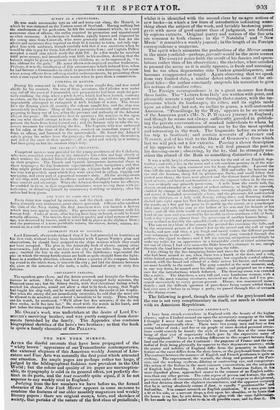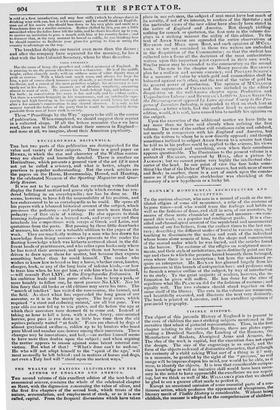THE NEW YORK MIRROR.
AFTER the direful accounts that have been propagated of the " whity brown" appearance of our Transatlantic contemporaries, the external elegance of this American weekly Journal of Lite- rature and Fine Arts was naturally the first point which attracted our attention. Its ample pages are perhaps rather too large, if judged by the bibliographical fashions now prevalent in the Old World; but the colour and quality of its paper are unexception- able, its typography is solid in its general effect, yet perfectly dis- tinct in its parts, and the tout ensemble quite equal, if it be not superior to any weekly-rival in England. Judging front the few numbers we have before us, the formal character of the New York Mirror appears in some measure to combine the features of our older monthly magazines and weekly literary papers : there are original essays, tales, and sketches of society, that partake of the nature of the first class of periodicals;
whilst it is identified with the second class by meagre notices of new books—in which a few lines of introduction indicating some- thing about the subject of the work, and lavishly bestowing pane- gyric with more of good-nature than of judgment, are followed by copious extracts. Original poetry and notices of the fine arts are common to both classes: in the " Notabilia " and " New Music" it resembles a weekly journal; in the length of its Foreign corresrondence a magazine.
The spirit which animates the productions of the Mirror seems in the main youthful—perhaps juvenile would be the more correct term. The essayist pours forth the result or his fancies and specu- lations rather than of his observation ; the sketcher, when satisfied to present the scene as it is really appears, is fresh and amusing; but he too often degenerates into Yankee grandiloquence, and becomes exaggerated or turgid. Again observing that we speak from very limited data, a similar defect attends some of the ori- ,,inal tales—the author constantly suspends his narration to give his notions de omnibus rebus.
The Foreign correspondence is in. a great measure free from these faults. The " Letters front Italy • are written with point, and pleasantly narrate a rapid tour through that country, with the im- pressions which its landscapes, its cities, and its sights made upon an educated but not, we incline to guess, a well-instructed American. "Pencillings by the Way," appears to be an account of the American poet's (Mr. N. P. WILLIS) journey in England; and though he seems not always sufficiently guarded in publish- ing the private conversations of marked individuals to whom he was introduced, his communications are by far the most spirited and interesting in the work. The fragments before us relate to his trip to Scotland ; and contain accounts of JEFFREY and 11- usosr, and of' his visit to the Duke of GORDON'S; from which last we will pick out a few extracts. Passing a clever description of his approach to the castle, we will first present the poet in his dressing-room ; observing, by the by, that he strangely con- siders the riband of the Bath as something distinctive of a duke.
It was a mild, bright afternoon, quite warm fiir the end of an English Sep- tember ; aud with a tire HI the room and a soft sunaliine pouring in at the win-
dows, a seat by the open casement was far from ilisagreeable. I passed the
time till the- sun set looking omit Oil the park. Ilill and valley lay between my eye and the horizon, sheep fed i mt picturesque Iliwka, and small fallow deer grazed near thou ; the trees were plaided and the distant ffirest shaped by the hand of ta,te, and broad and beautiful as ',s a- the two:tit-Ai taken in by the eye,
It ii is evidently one princely possession. A mile front the castle wall, the shaven award extentkat in a carpet of velvet softness. as bright as emerald, atudded by el ps of shrubbery, like fitment. wrought elegantly on tapestry, and acroas it bounded occasionally a let me, and the pheasant, fed listurbed near the thiekets, or a lady with flowing riding-dresa and Haunting feather
dashed into sight noon her fleet blood palfrey, and wa, 1t it the next moment iii the woods, or a boy put his pony to its mettle up the a,cent, or a gamekeeper iffied iuto sight with hia gnu in the hollow of his arm and his hounds at his heel: : anal all this little %% odd of enjoyment :mil luxury and beauty lay in the hand a olle mat, aud a as created lm his wisilth in these northern wilda of Scot- land, a day", journey almost front the poss,---iou of another human being. I never realized SD foreildy the splendid reaulm. of wealth and primleawniture.
The sun set in a blaze of fire am llll g the pointed firs crowning the hills, and by the occasional prance of a horse'', feet on the gravel and the roll of rapid wheels, and now timid then a gas laugh and merry voices, the different parties
were echo- ll i l g to time castle. Atom after, a loud g llll g sounded through the
gallery— the signal to dress; and I left my nmaing occuwaion unwillingly to make my toilet fire an appearance in a formidable eirde of titled aristocrats, not one of whom I had ever seen—the Duke himself a stranger to me, except through the kind letter of invitation lying upon the table.
I was sitting by the fire imagining forms and faces for the different persons who had been named to me, when there was a knock at the door, and a tall, white-haired gentleman, of noble phyaiog but singularly cordial address
entertal, with the broad nal riband of a duke across his breast, and welcomed Inc most heartily to the castle. The gong sounded at the next moment, and, in our way down, he named over his other guests, and prepared me in a mea-
sure for the introductions which fiffiowed. The drawing-room was crowded like a soiree. The Dutehess, a very tall and very handsome woman, with a smile of the must winning sweetness, receivtal me at the door, and I was pre- sented successively to every person present. Dinner was announced imme- diately ; and the difficult question of precedence beim,. sooner settled than I had ever seen it before in so large a party, we passed through files of servants to the dining-nann.
The following is good, though the simile of the greyhound and the cur is not very complimentary in itself, nor much in character with an American Republican.
ENGLISH ARISTOCRACY.
I have been struck everywhere in England with the beauty of the higher classes and as I looked around Inc upon the aristoeratic company at the table, thought I never had seen " heaveu's image doubly stamped' as man and noble" all unequivocally dear. There were two young men and four or five young ladies of rank ; and five or six people of name decided personal attrac- tions could scarcely be found ; the stile of ffirm and face at the same time being of that cast of superiority which goes by the expressive name of " thoroughbred." There is a striking difference in this respect between Eng- land and the countries of the Continent : the paysaos of France and the coo- tadiai of Italy being physically far superior to their degenerate masters; while the gentry and nobility of England differ front the peasantry in limb and feature as the racer differs front the dray-horse, or the greyhound front the cur. The contrast between the manners of English and French gentlemen is quite as striking. The empressment, the warmth, the shrug and gesture of the Pari- sian, aud the working eyebrow, dilating or contracting eye, and conspirator- like action of the Italian in the at etmimutmn conversation, are the antipodes of English high breeding. I should say a North American Indian, in his more dignified phase, approached nearer to the manner of an English noble- man than any other person. The calm repose of person and feature, the self- po,session under all circumstances, that incapability of surprise or dereylement,. and that decision about the slightest eiremnstance, and the apparent certainty that he is acting absolutely comae ii fisut, is eqmmahly " gentlemanlike an Indianlike. You cannot astonish an English g,entlemain. If a man goes mtaa a fit at his side, or a servant drops, 0.ihish upon his shoulder, or he hears 9341 the house is on fire, he sets dowm is wine-ghtos. with the same thaihernisons lie hwt etade up his mind what to du in all rossibia ca,setki and kcdttes.it, Bit
is cold at a first introduction, and may bow otiffy (which he always does) in drinking wine with you, but it is his manner ; and he would think an English- man out of his menses who should how down to his very plate and smile as a Frenchman does on a similar occasion. Rather chilled by this, you are a little astonished when the ladies have left the table, and he closes his chair up to you, to receive an invitation to pus a mouth with him at his country-house ; awl to discover that, at the very moment be bowed so coldly, he was thinking how he should contrive to facilitate your plans for getting to him or seeing the country to advantage on the way.
The breakfast delights our tourist even more than the dinner ; and after the company have separated for the morning, he has a chat with the late Colonial Secretary, whom he thus describes.
1.0110 AINVADEY.N
Has the name of being the proudest and coldest aristocrat of Englahd. It is amusing to see the person who bears such a character. Ile is of the middle height, rather clumsily made, with an address more of sober dignity than of pride or reserve. With a black coat much worn, and always too large for him, a pair of coarse cheek trousers very ill-made, a waistcoat buttoned up to his throat, and a cravat of the most pr. -tive rie'srlig(:, his aristocracy is cer- tainly not in his dress. His manners are of absolute simplicity, amounting almost to want of stvle. He crosses his hands behind him, and balances 011 his heels: in conversation his vo;ce is low and cold, and be with Yet there is a certain benignity in his countenance, awl an indefinable supe- riority and high breeding in his simple address, that would horny his rank after a few minute's conversation to ally shrewd observer. It is onlv in his manner toward the ladies of the party that he won hl be immediately. distin- guishable from men of lower rank in society.
These " Pencillings by the Way" appear to be still in the course of publication. When completed, we should suggest their reprint in a collected shape. If all the letters resemble theoe we have read, there can be little doubt about their success in England— and none at all, we imagine, about their American popularity.



























 Previous page
Previous page